The comprehensive guide to planning a career break
At some point in everyone’s career, we have all imagined taking an extended break from working. Whether you hate your job and have the overwhelming desire to scream “I quit!!!” and storm out, or a quieter desire to get out of the daily grind and enjoy more free time to focus on your family and passions —it’s a fantasy we can all relate to.
After a decade or so spent climbing the corporate ladder and paying your dues, you may find yourself like many modern professionals today —burnt out, exhausted, or just needing a break to focus on other parts of your life. But you can’t take a break! You still have 20+ years until your 401K is fat enough that you can enjoy your retirement with all the other tired sixty–year–olds.
Is that really how you want to live the best years of your adult life?

The rise of the career break
The concept of a career break has become more mainstream in the years since the pandemic. After people worldwide were forced to work remotely or laid off and the idea of work-life balance was utterly turned on its head, it’s only natural that the world views professional journeys differently now. Employers do not frown at career gaps on resumes like they might have ten years ago, and LinkedIn has even incorporated a “career break” feature on their platform. The times are changing.
If you are still thinking about the possibility of taking some much-needed time away from your career but are not sure how to work that into your life, let’s walk through the process step-by-step. Starting with the most fundamental aspect —asking yourself why you want a break in the first place.

First, you need to understand why you are considering a career break. There are no right or wrong reasons to feel this longing, but you need to identify your motivation for leaving a job before determining how to do so effectively.
1. Ask yourself why a career break appeals to you
Ask yourself the hard questions, and be honest with yourself.
Would you be happy in a similar role at another company?
Would you be happy at this company in a different role?
Do you generally like your job and company, but just need a break longer than what your benefits allow for personal reasons?
Are you feeling overwhelmed by obligations in your personal life that require your attention more than what your job allows?
Do you want to pursue something entirely different, such as starting your own business or pursuing a new field?
Are there other stressors or factors in your personal life that are influencing your attitude in general, including toward your job?
Are you simply tired and stressed and frustrated all the time and just need a friggin’ break?!?
Take some time to evaluate each of these questions and truthfully acknowledge your actual concerns in your career.
2. Determine what you actually need (and want)

Once you have a clear picture of why you desire a career break, you are ready to determine what you really need (and want) to do given your situation.
Evaluate available options
If you are faced with an urgent or immediate need for time away from work, such as caregiver responsibilities for a child or elderly parent, you may have options to take an extended leave from your job. You could be eligible to continue earning a portion of your salary and maintain your employee benefits using Short-Term or Long-Term Disability coverage. At the very least, you can ensure you have a job to return to after a designated period of time, as mandated by the Family Medical Leave Act. Have an honest conversation with your manager or Human Resources teams about your situation; there are likely some options to provide you with the support (and time) you need.
Maybe you enjoy your job and company yet find yourself wanting an extended period away to rest, travel the world, or finally work on that novel you’ve been dabbling in for five years —ask! Sabbaticals are no longer a dirty word in the workplace as some companies are starting to implement sabbatical leave programs into their employee benefits packages. Just be prepared for whatever answer you may get (such as, “Ummm, no”) and have a backup plan for what to do next.
Perhaps you enjoy the work or the people or the company, but something about your career dynamic isn’t working for you. It might be time to start looking for another job, within your company or externally. Brush off the old resume, reach out to your contacts, and investigate other opportunities. With a bit of patience and persistence, you are sure to find a better fit out there.
Career break as the last option
The last situation is when there is no clear option available. You dread logging into work every day, but don’t think the grass is any greener at another company. You feel unfulfilled professionally and too bogged down in your daily responsibilities to think clearly enough to figure out a better option. You’re burnt out and unhappy at work, and it has also started impacting your personal life. You simply need some time away to reflect and determine what you want long-term. This is when a career break might be the right option.
It is essential to evaluate all these potential needs and options before immediately deciding the only solution is to take a career break. Because while a career break sounds like the ultimate dream after years spent working hard for that cheddar, it is not the easy solution in the long run and requires a lot of preparation to do successfully.
3. Set objectives and goals for your career break

Going back to step #1, evaluate your reasons for wanting a career break in the first place. Regardless of time and money (don’t worry, we’ll get there), what would you like to do and accomplish during your extended time off?
Have you always dreamed of {insert goal here} but never had the time to make it happen? (This can be anything you’ve always wanted to do —starting your own business, writing a book, pursuing painting, or traveling the world.)
Do you want to use this time to pursue higher education or certification to further your career when you do return to the workforce?
Would you like to engage a career coach or start networking to help you identify a new career path for the future?
Do you want to take time to focus on being a wife, a mother, or a daughter without worrying about your professional obligations?
These are just a few questions to ask yourself as part of this goal-setting process. Reflecting on how you will spend your time if you take a career break is a vital step as part of the planning process.
While you definitely can (and should!) use some time to rest and reflect during your break, there should be a purpose to your time off. Listen to your Intuition during this exercise —chances are she already has a few ideas of how you can spend your time.
Enjoying this article? Check out one of these reads next!
4. Engage those closest to you in the planning process

At some point early in the career hiatus planning, you need to let a few select people in your life in on your secret plans. This means having a serious conversation with your partner or anyone else you will need support from during this process.
Just as you had to walk yourself through the steps and thought process to get comfortable with a career break, you must do the same with them. Especially with a long-term partner with whom you share financial responsibilities, you must ensure you are on the same page and support each other on the difficult road ahead.
A critical clarification for this step is DO NOT TELL EVERYONE. Your goal at this early stage is to formulate a plan with those you share your life with, not seek approval or advice from friends and family. You may not like the responses you hear from others, which could result in self-doubt or confusion about your decision. Not to mention, it would be pretty disruptive if your boss or coworkers got wind of your decision before you were ready to resign.
Keep your circle small and supportive. There will be a time to communicate to the broader audience later.
5. Create a financial plan*

Taking a career break bears a heavy financial burden and has its fair share of risks, so it is crucial to establish a financial plan before taking any action. This ensures you can enjoy and utilize your break without additional financial worries.
Assess your financial situation
First, create a monthly expense budget. Go through the past six to twelve months of expenses to calculate your average monthly costs. Evaluate opportunities to cut out unnecessary expenses (do you really need Netflix and Hulu, or could you get by with just one for a while?). Are there expenses you won’t incur when you are not working (such as childcare or commuting expenses)? Be sure to plan for unforeseen expenses you would have to pay regardless (I’m looking at you, unplanned plumber’s invoice), and perhaps even add a 10-30% expense cushion to your total expense estimate to be safe. If you are looking for more guidance on how to manage your money, check out this article about spending money wisely.
Next, sum up your other income sources (such as your partner’s salary or rental property income) and evaluate any expendable funds in savings. Perhaps you have money socked away for a big vacation or a new car in the future but could hold off another year to make that splurge purchase. As long as you keep an adequate emergency fund in case of a catastrophic event, you might consider using these extra savings to cover monthly expenses during your break.
Be realistic about your financial plan
Now it’s time to look at your overall financial picture and see if you can afford a career break. Based on your other income sources and extra savings, how many months of your average expenses can your household afford you to be unemployed? What will this do to your retirement and kids’ college savings plans? Will you need to find part-time work during your career break to fill the financial gap? Can you create a savings plan for the near future to be better prepared financially to quit your job at a later date?
Compile the numbers, do the math, and be realistic. Now is the time to ask yourself what you’re willing to sacrifice financially to make your career break a reality.
If you still require more preparation or guidance, you can always enlist the help of a financial professional for support while creating your financial plan. It is better to be safe and conservative when planning for your financial future in a situation such as this.
6. Make sure you’re covered (by insurance, that is)

Many individuals are covered by sponsored health, life, disability, and other types of insurance through their employer. But without an employer, you must find other insurance options to protect you and your loved ones.
Health, dental, and vision insurance
Suppose you are covering yourself, a partner, or your children through your employer-sponsored health, dental, or vision insurance. In that case, you need to plan for alternate coverage before leaving your job. Lack of planning could have considerable financial and health implications if you find yourself in a medical emergency without insurance coverage.
Can you and your family get insurance through your partner’s employer? This is likely the most straightforward and cost-effective approach to ensuring adequate coverage. Ask your spouse to start inquiring with their employer about the process and requirements.
Depending on your income level during your career break, you may be eligible for subsidized insurance through the Affordable Care Act or Medicaid.
A final option is to continue your current employer-sponsored insurance through COBRA for a designated period of time. This can be rather costly as you pay the full price for insurance plus an administrative fee, but it might be a reasonable option for a short period of time.
Other types of insurance
Review your current insurance coverage from your employer to determine if there are any policies you should continue once unemployed. You can often continue your insurance coverage through the current provider by transitioning to pay out of pocket. Like medical insurance, you may be eligible for coverage through your partner’s employer. Otherwise, you can apply for a new insurance policy through a separate company.
Evaluate what insurance types you need to continue coverage during your career break and which policies (if any) you can let go. By understanding what you need beforehand, you will be better prepared to discuss your options with your employer’s Human Resources team after you turn in your official resignation.
7. Establish a timeline

It might feel tempting to throw all plans to the wind once you’ve decided to leave your career, but you must establish a timeline to make the most of your break. Based on your financial plan (#5) and goals (#3), determine how long you can conservatively plan to take a break.
Define specific dates for which you would like to accomplish certain milestones to reach your goals. This will not only keep you motivated to spend your time wisely (as opposed to using the first two months to binge-watch the Hallmark channel in your pajamas) but will also set certain checkpoints to assess your progress and adjust your long-term plan as needed.
If you plan to seek another job after a certain amount of time, designate a date at least a few months in advance to begin your job search. Finding the right job, interviewing, and landing the position will take some time, so ensure you have enough funds to last through the whole process.
As time flies by during your career break, you may discover that your plan and goals (and, therefore, your timeline) have evolved. The more distance from work, skills, and experiences you accumulate, the more likely your long-term vision for your career is to change. And that is 100% okay. That is precisely what this time is for —exploring new opportunities; uncovering untapped skills and passions; learning new things and expanding your mindset; and, ultimately, reimagining what you want for your future.
Use this time to its fullest potential —but within the guardrails of a defined timeframe.
8. Finalize your career break plan

Before you’re officially ready to pull the plug on that job, make sure you’ve fully prepared for the domino effect you are about to trigger.
If you want to spend your break completing professional certifications or going back to class, ensure you have all the applications approved, and the timing aligns to your last day and career break timeline.
Planning to start your own business while you finally have the capacity to get it launched? Prepare your business plan, research the legal requirements, and investigate your competition to understand best practices.
Have dreams of taking your family on an extended vacation this summer since you finally don’t have to clock in every day? Outline your trip itinerary and look for airfare and travel deals in advance to ensure you have the vacation of a lifetime.
Whatever your goals for your career break, be sure you do some preemptive work before your last employed day so you can maximize your experience once the time comes.
9. Leave your job (the right way)

The time has finally come; you are ready to draft that resignation letter and have “the talk” with your boss. While resigning is never pleasant, you can leave on good terms by handling your departure professionally.
Give adequate notice to your employer to allow enough time to transition your responsibilities to others. The standard timeframe in the US is two weeks, but most employers (and coworkers) appreciate additional time if you can accommodate it.
Organize your assignments, document the tasks and processes you manage, and share all relevant information with team members who should be involved. Often, it’s hardest on the coworkers picking up your old responsibilities when you leave, so do whatever you can to make your departure as easy on others as possible. It’s not just professional but also the nice thing to do.
Regardless of your reasons for leaving, finish your remaining time in your job with respect, compassion, and professionalism. This behavior is always admired in the workplace—and in life.
10. Make the most of your time

It is the big day. You pack up your last remaining items in the office. You turn in your equipment and badge. And you walk out of your office one final time.
You may feel emotional, scared, relieved, or all of the above. These feelings are all totally normal. Allow yourself some time to process these emotions —then set them aside. Remember, the whole goal for this time is to focus on yourself and your loved ones, your dreams, and your plans. Now is the time you’ve been preparing and waiting for, so don’t waste it!
Embracing the unknown of a break
When I initially left my career in March 2023, it was only after a lot of careful planning, soul-searching, and support from my spouse. And even after all that preparation, I was an emotional wreck for a while. Luckily, I had a feeling that this would be the case and had factored that pity party time to decompress from the corporate culture into my overall financial plan and timeline.
Although the original intent when I left my job was to take time off to focus on my family and myself before looking for a new role, I quickly found myself dreaming of a much different path as the months went by. With more time to reflect and explore other opportunities, I found a new passion that I’d never allowed myself (or even had the time) to consider in the past. My love for entrepreneurship blossomed, my dreams of starting my own business became more realistic, and finally, Breakthrough Loading was founded. None of this could have happened if I hadn’t given myself the space and clarity of time away from the workforce to figure it out.
Whatever you hope or dream to accomplish during your career break, allow yourself the chance to fully experience this hard-won time by preparing beforehand. Walk in, eyes wide open with a plan and a timeline —but most importantly, with the desire to embrace this career break for the rare opportunity it is.
You’ve earned it.
*Disclaimer: This article should not be considered professional financial guidance. Please make responsible financial decisions for yourself and your family, and seek help from a financial professional if necessary. Back to reading
Have you ever considered taking a career break? What would you like to accomplish if you had the time away from the workforce? Share with us in the comments!
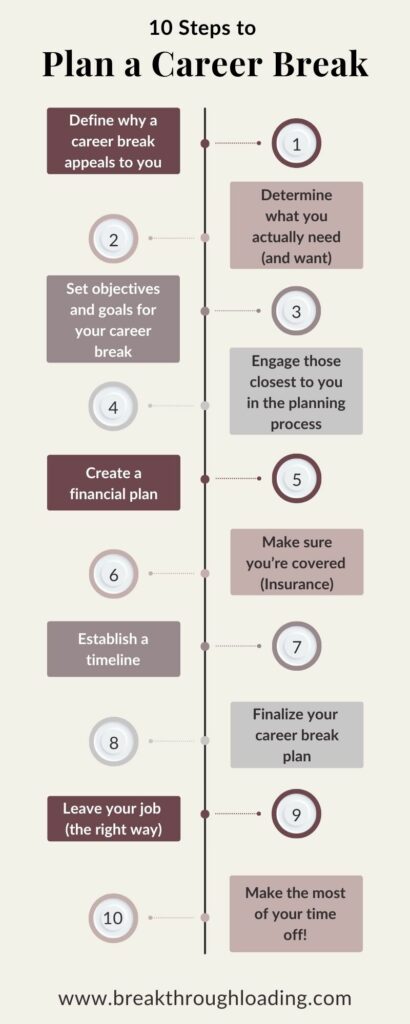

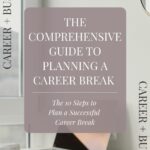
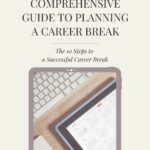
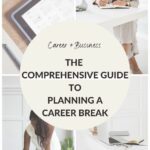
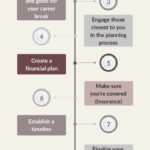



Working is very tiring and there are times that we will think about having a career break after many years of working nonstop. Thank you for writing this article because it’s such a big help!
Thanks Leslie, I hope this is helpful for anyone trying to make that big move. It is not an easy decision!
I love all the points made here as without a plan, any financial stress can easily take over from work stress! I especially love the questions to ask yourself at the beginning of this post as sometimes our “need” to get away from a particual job isn’t driven from what we initially think it to be!
I appreciate that Katherine! I truly believe understanding your why is such an important part of this career break planning whole process. And honestly, in life in general! Thanks for reading.